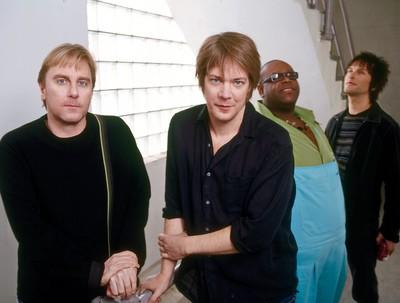Finding the ‘Silver Lining’

It could be worse,” Dave Pirner says with a laugh, the kind of self-deprecating little snicker normally reserved for flipping through old photo albums and wincing at past haircuts.
The Soul Asylum frontman is reflecting on his band’s breakout disc, 1992’s “Grave Dancer’s Union,” an album of gravelly heartland alt-rock that’s come to define the group, whether they like it or not.
And sometimes they don’t.
Sometimes they get tired of playing the dusky, missing-child ballad “Runaway Train,” which turned nearly 10 years of sweating it out in closet-sized rock clubs into a double platinum record and somehow rendered the affable, distinctly Midwestern Pirner the unlikeliest of tabloid fodder.
Looking back, Pirner chuckles at his band’s meal ticket, sounding happy to be taking a break from doing a little home improvement work on a recent Monday afternoon to talk about the album that’s cast a shadow over his band’s long career.
“It could have been a covers record,” he says of “Union” good humoredly. “We went out with Los Lobos for a little while, and it was right when they had covered ‘La Bamba,’ which was a huge hit for them. So they would go out every night and play all their Los Lobos material, which was some incredible material, and the crowd was just sort of waiting for them to play ‘La Bamba.’ The sarcasm was not lost on the band, ‘All these people have never heard “La Bamba,” and now we’re known for “La Bamba” instead of all these beautiful songs that we’ve written.’ ”
Pirner feels a similar strain from time to time, like when people come to his band’s gigs and expect them to be a ’90s modern rock jukebox come to life.
“We’re not always crazy about showing up and playing all the hits and just blowing people away with all our best songs and getting out of there,” Pirner says. “But more often than not, it’s kind of what’s expected, and it’s the only option, really.”
Still, Pirner’s too much of a cash-and-carry, meat-and-potatoes kind of guy to bemoan a record that’s helped pay for his home. That’s the kind of stuff that rock stars do, and Pirner always has had the air of a shy record store clerk who somehow made it big.
“For us, it was a ticket to survive,” Pirner says of the success of “Union.” “We had amassed so much debt at that point and had done all the suffering and dues paying that anyone should ever have to do.
“To a degree, we did a lot of things that anyone would do,” he continues, speaking to how the band’s members struggled with their success for a time, “like spend too much money on a light rig that you carry around with you and sometimes you can’t even fit it into the freakin’ club. ‘OK, now we’re going to have a bus and this and that.’ It’s amazing how nice some things can be and at the same time, how completely unnecessary they are. If you can afford five bodyguards, you might as well have five bodyguards, but hey, do you really need five bodyguards?”
But ultimately, this band has long been defined by its resiliency.
They bashed out greasy, sweat-soaked rock ‘n’ roll to critical acclaim but little album sales for close to a decade before the more polished, radio-friendly “Union” made them household names.
The Minneapolis-born band never was able to duplicate the success of that disc, and after a pair of modestly selling follow-up efforts, they went on hiatus in the late ’90s.
Eventually getting back together, the group was dealt another setback when bassist and founding member Karl Mueller died of cancer in the summer of 2005.
“If we were going to quit, we would have quite a long, long, long time ago,” Pirner says. “There isn’t anything that we haven’t encountered. As bad as things can possibly be, we’ve seen it. We’ve been through all the pratfalls and disasters that could be wrought upon any band. That just makes it seem all the more worthwhile, representing what we’ve stood for, for all these years.”
Nowadays, the band is playing primarily on weekends and trying to raise awareness for their latest disc, the driving, bittersweet “Silver Lining.”
True to that album’s title, Pirner remains something of an optimist, aware that some may dismiss his band as a one-hit wonder, a punch line, but he’s quick to get the first laugh in.
“It feels like a joke when I say, ‘Man, it’s good to be anywhere right now,’ ” he chuckles, “but there’s some truth to it when you consider all the BS that we’ve been through and the life and death experience that we’ve had and just trying to keep it going. You get a feeling that you’ve been through a lot with some of the people who come to the shows these days. We’re like, ‘Wow, we’ve been through a lot together and we’re still here.’ And that’s saying something.”
who: Soul Asylumwhen: 8 p.m. Saturday
where: The Railhead at Boulder Station, 4111 Boulder Highway
tickets: $28.50-$48 (547-5300)












